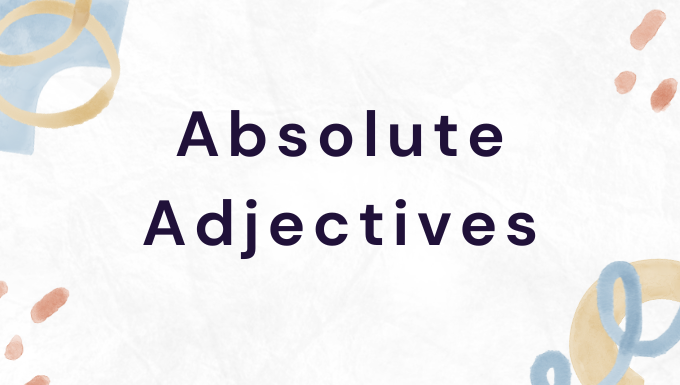
Table of Contents
Have you ever heard someone say something is “very unique”? Well, technically, that’s not quite right. This is where the concept of absolute adjectives comes into play. Let’s break it down in plain English.
What are Absolute Adjectives?
Absolute adjectives describe qualities that are either completely present or not at all. They don’t have different degrees. Think of it like a light switch – it’s either on or off, with no in-between. Some common examples of absolute adjectives are: perfect, dead, unique, absolute, and empty.
Examples in Everyday Language
- Unique: Something is either unique or it’s not. You can’t be “very unique” because unique means being the only one of its kind.
- Dead: This one is straightforward. Something is either dead or alive. There’s no such thing as “slightly dead” or “very dead.”
- Perfect: If something is perfect, it’s flawless. Saying “more perfect” doesn’t really make sense, as perfect is an absolute state.
Why Does It Matter?
Understanding absolute adjectives helps us communicate more clearly and correctly. It’s not just about grammar rules; it’s about conveying your message without confusion. For instance, if someone says a glass is “completely empty,” it’s redundant. Saying “the glass is empty” is enough to convey the absolute state.
Common Mistakes to Avoid
- “Very unique”: Use “unique” on its own.
- “More perfect”: Stick with “perfect.”
- “Completely empty”: Just say “empty.”
Fun Fact
Even though absolute adjectives technically shouldn’t be modified, people often do it for emphasis in casual speech. It’s not grammatically correct, but language is always evolving, and sometimes these rules bend in everyday use.
Conclusion
Absolute adjectives are a neat part of English language. They remind us that some qualities are black and white, without shades of grey. By using them correctly, we can make our communication clearer and more precise. Remember, language is a tool, and understanding its nuances like absolute adjectives makes us better at using it.
Test Your Understanding of Absolute Adjectives
Here’s a short quiz to test your understanding of absolute adjectives. Choose the most appropriate option for each sentence:
Quiz: Absolute Adjectives
- The diamond in the museum is _______.
- (A) somewhat unique
- (B) very unique
- (C) unique
- After the renovation, the room looked _______.
- (A) completely empty
- (B) emptier
- (C) empty
- The solution to the puzzle is _______.
- (A) more perfect
- (B) perfect
- (C) very perfect
- The historical fact is _______.
- (A) quite true
- (B) truer
- (C) true
- The ancient vase was found to be _______.
- (A) completely intact
- (B) more intact
- (C) intact
Answers
- C – unique: Unique means being the only one of its kind, and it doesn’t have degrees.
- C – empty: Empty is an absolute adjective. The room is either empty or it’s not.
- B – perfect: Perfect means having no flaws or defects, and it can’t be more or less perfect.
- C – true: A fact is either true or not true. There are no degrees of truth.
- C – intact: Intact means not damaged or impaired in any way; it’s absolute and doesn’t have degrees.
How did you do? Remember, absolute adjectives are about all or nothing, and understanding them helps in making our communication more precise and clear!
Absolute Adjectives FAQs
FAQ 1: What Exactly is an Absolute Adjective?
Answer: An absolute adjective describes a property that is either completely present or completely absent. It’s an all-or-nothing deal. For example, when we say something is “empty,” it means there is nothing in it; it can’t be “more empty” or “less empty.” Other examples include “dead,” “perfect,” and “unique.” These words represent states that cannot be quantified or compared on a scale.
FAQ 2: Can Absolute Adjectives Ever Be Used in Comparative or Superlative Forms?
Answer: Technically, no. Absolute adjectives should not be used in comparative or superlative forms because their meanings already imply the extreme degree of a quality. For instance, “perfect” means without any flaws, so saying “more perfect” or “the most perfect” doesn’t make logical sense. However, in informal and colloquial language, people often bend this rule for emphasis or stylistic reasons.
FAQ 3: How Do I Know If an Adjective is Absolute?
Answer: An easy way to determine if an adjective is absolute is to ask yourself if the quality it describes can be measured or graded. If it can’t, then it’s likely an absolute adjective. For example, consider the word “married.” There are no degrees to being married; you either are or you aren’t. Similarly, something is either “whole” or not. If you can logically add “very” or “somewhat” in front of an adjective, then it’s probably not absolute.
Remember, while these rules generally hold true, language is dynamic and constantly evolving. In everyday speech and writing, you might find absolute adjectives being used in ways that technically defy these guidelines!